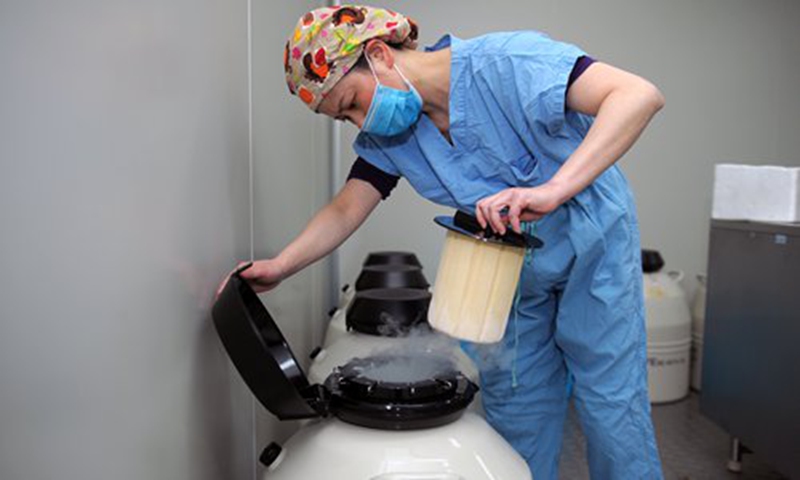A Chinese political advisor will raise a proposal to gradually open egg-freezing access to unmarried women and include infertility treatment in the public health insurance system, as the country has seen a negative population growth for the first time in 61 years.
“I wish some breakthrough can be made in loosening rules on egg-freezing for single women in a bid to effectively preserve and protect their fertility,” Lu Weiying, a member of China’s top political advisory body, told the Global Times on Monday.
As the chief expert from the Reproductive Medical Center of Women and Children’s Medical Center in South China’s Hainan Province, Lu arrived in Beijing on Sunday for the upcoming first session of the 14th National Committee of the Chinese People’s Political Consultative Conference (CPPCC) on March 4.
Lu said giving single women access to freezing their eggs means to preserve the eggs before they past their peak reproductive years. “The woman still needs to get married if she wants to use her frozen eggs and get pregnant in the future.”
In 2021, China’s national health commission said it banned hospitals and clinics offering egg-freezing procedures and in vitro fertilization (IVF) to unmarried women given the health risks in collecting eggs. The opening of egg freezing may also lead to the commercial transaction, breaking moral principles.
Lu said relevant departments and experts should discuss the safety concerns of opening egg-freezing and could make pilot programs in certain places, such as Hainan Free Trade Port and Boao Lecheng pilot zone of international medical tourism, to sum up experience and decide to loose or tighten relevant rules before making a safer policy.
China’s National Healthcare Security Administration said in February it will gradually put the labor analgesia and assisted fertility technology (AFT) under the coverage of medical insurance, without providing a specific and detailed plan.
Despite that Beijing said that it would adopt a total of 16 AFTs into the medical insurance from March 26 in 2022, multiple hospitals in Beijing said the policy has been suspended, the health channel of People’s Daily reported.
Lu told the Global Times that the inclusion of AFT in the medical insurance means huge amount of money and large amount of work for the Healthcare Security Administration. Lu thus suggested to set up a timetable for the inclusion and first put the treatment of infertility under coverage.
“The treatment of infertility usually doesn’t cost much. And many of the infertility patients don’t need AFT if their problems can be solved at this stage, which will in the end save the money the medical insurance may spend on AFT,” said Lu.
Lu’s suggestions came amid the first population fall in the Chinese mainland in 61 years in 2022. Data released by the National Bureau of Statistics of China showed that the population has decreased by a total of 850,000.
To boost the record low birth rate, Lu called for convenient and professional medical services for women who pursue ART services in rural areas and third-tier cities so that more infertile people can get timely treatment.
Grass-root medical institutions can boost their ability in receiving such patients through trainings in large cities’ hospitals since such services were mostly available in first-tier and second-tier Chinese cities, Lu said.
Lu said more efforts are needed to deal with discrimination against women of childbearing age in workplaces, suggesting to raise childbirth allowance, extend maternity leave, provide more professional and low price babysitter services in child cares institutions.













